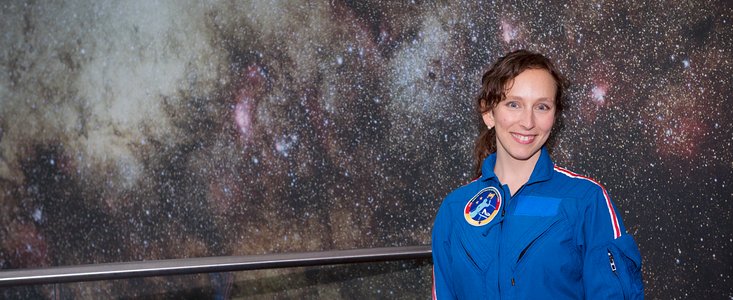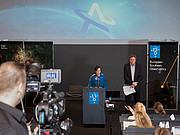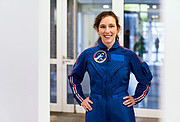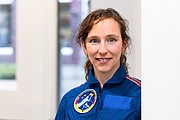Persbericht
ESO-astronoom geselecteerd voor astronautentrainingsprogramma
16 februari 2018
ESO-astronoom Suzanna Randall is een stapje dichter bij haar droom om de eerste Duitse vrouw te worden die de ruimte in gaat. Ze is gekozen als nieuwe trainee van het initiatief Astronautin, dat tot doel heeft de eerste vrouwelijke Duitse astronaut te trainen en haar voor een onderzoeksmissie naar het internationale ruimtestation ISS te sturen. Dat is vandaag bekendgemaakt tijdens een persconferentie op het hoofdkantoor van ESO in Garching, Duitsland.
Het initiatief Astronautin werd in 2016 opgezet om jonge vrouwen te inspireren om beroepen te kiezen in de ruimtevaart, wetenschap, wiskunde en technologie, en om de eerste vrouwelijke Duitse astronaut de ruimte in te sturen. Ook zal het de microzwaartekrachtomgeving van het internationale ruimtestation ISS gebruiken om te onderzoeken hoe het vrouwelijk lichaam op gewichtloosheid reageert [1].
Dankzij haar wetenschappelijke achtergrond en sportieve talenten is Suzanna Randall geselecteerd als een van de twee Astronautin-trainees. De 38-jarige in Keulen geboren Randall studeerde astronomie in het Verenigd Koninkrijk voordat zij aan de Universiteit van Montreal in Canada afstudeerde en promoveerde in de astrofysica. Ze werkt momenteel als astronoom bij ESO.
Randall begon haar ESO-carrière als ESO Fellow en is nu betrokken bij het ALMA-project, een internationaal samenwerkingsverband dat ’s werelds grootste radiotelescoop in de Chileense Atacama-woestijn exploiteert. ALMA bestaat uit 66 reusachtige antennes die millimeter- en submillimeterstraling opvangen en is het krachtigste astronomische instrument voor het onderzoek van het koele en verre heelal [2]. Randall bestudeert ook de evolutie van pulserende, blauwe, subdwergsterren. Ze is al jaren een fervent paraglider, is een getraind yoga-instructeur en geniet van wintersport.
De kandidaat-astronauten worden in het Astronautin-trainingsprogramma vertrouwd gemaakt met de omgeving van het ISS, en leren meer over de systemen en procedures aan boord. Het programma omvat ook deelname aan allerlei activiteiten die hoge eisen stellen aan de kandidaten, zoals paraboolvluchten, survivaltraining, vliegtraining en robottraining.
Randall legt uit wat haar motiveerde om bij Astronautin te solliciteren: ‘Ik wil laten zien dat het voor gewone vrouwen mogelijk is om de nodige kennis en vaardigheden te ontwikkelen om astronaut te worden. En ik denk dat het belangrijk is dat vrouwen op alle niveaus van de samenleving vertegenwoordigd zijn. Het moet vanzelfsprekend zijn dat vrouwen in de ruimte werken.’
De komende twee jaar zal Randall het voor de enige beschikbare ruimtemissiefunctie opnemen tegen de 34-jarige meteoroloog Insa Thiele-Eich, die in april 2017, samen met Eurofighter-piloot Nicola Baumann, uit 400 kandidaten voor het programma werd geselecteerd. Nadat Baumann het project had verlaten, besloot de selectiecommissie unaniem om Suzanna Randall als plaatsvervanger aan te wijzen.
‘We zijn blij dat Suzanna Randall met haar expertise als astrofysicus direct in de training kan stappen,’ zegt Claudia Kessler, initiator van Astronautin.
Randall en Thiele-Eich worden bij hun training ondersteund door luchtvaartbedrijf Airbus. Het innovatiebedrijf HYVE werkt met Astronautin aan een uitdagende crowdsourcingcampagne. Samen ontwikkelen ze ideeën en oplossingen om de ruimtemissie van de eerste vrouwelijke Duitse astronaut te financieren. Het persconferentie-evenement werd ondersteund door IWG Isolier Wendt GmbH uit Berlijn.
Noten
[1] Het internationale ruimtestation ISS is een bemande satelliet die mogelijk is gemaakt door een samenwerking tussen Europa, de Verenigde Staten, Rusland, Japan en Canada. Het 360-ton zware ruimtestation omvat meer dan 820 kubieke meter aan drukcabines die ruimte bieden aan een bemanning van zes astronauten en een breed scala aan wetenschappelijke experimenten. De bouw van het ruimtestation ging in november 1998 van start.
[2] Met een resolutie die tien keer beter is dan die van de Hubble-ruimtetelescoop van NASA en ESA, richt ALMA zich op enkele van de meest diepgaande vragen over onze kosmische oorsprong. De ALMA-sterrenwacht wordt gebruikt om de bouwstenen van sterren, planetenstelsels, sterrenstelsels en het leven zelf te onderzoeken. De enorme opstelling van reusachtige antennes, die onder de uitdagende omstandigheden van de hoge Andes opereert, maakt gebruik van geavanceerde technologie om zijn wetenschappelijke doelen te bereiken.
Meer informatie
ESO is de belangrijkste intergouvernementele astronomische organisatie in Europa en verreweg de meest productieve sterrenwacht ter wereld. Zij wordt ondersteund door zestien lidstaten: België, Brazilië, Denemarken, Duitsland, Finland, Frankrijk, Italië, Nederland, Oostenrijk, Polen, Portugal, Spanje, Tsjechië, het Verenigd Koninkrijk, Zweden en Zwitserland, en door gastland Chili. ESO voert een ambitieus programma uit, gericht op het ontwerpen, bouwen en beheren van grote sterrenwachten die astronomen in staat stellen om belangrijke wetenschappelijke ontdekkingen te doen. Ook speelt ESO een leidende rol bij het bevorderen en organiseren van samenwerking op astronomisch gebied. ESO beheert drie waarnemingslocaties van wereldklasse in Chili: La Silla, Paranal en Chajnantor. Op Paranal staan ESO’s Very Large Telescope (VLT), de meest geavanceerde optische sterrenwacht ter wereld, en twee surveytelescopen. VISTA werkt in het infrarood en is de grootste surveytelescoop ter wereld en de VLT Survey Telescope is de grootste telescoop die specifiek is ontworpen om de hemel in zichtbaar licht in kaart te brengen. ESO speelt ook een belangrijke partnerrol bij ALMA, het grootste astronomische project van dit moment. En op Cerro Armazones, nabij Paranal, bouwt ESO de 39-meter Extremely Large Telescope, de ELT, die ‘het grootste oog op de hemel’ ter wereld zal worden.
Links
Contact
Claudia Kessler
Stiftung erste deutsche Astronautin gGmbH
E-mail: claudia.kessler@dieastronautin.de
Richard Hook
ESO Public Information Officer
Garching bei München, Germany
Tel: +49 89 3200 6655
Mobiel: +49 151 1537 3591
E-mail: rhook@eso.org
Marieke Baan (Perscontact Nederland)
ESO Science Outreach Network
en NOVA Informatie Centrum
Tel: +31(0)20-5257480
E-mail: eson-netherlands@eso.org
Over dit bericht
| Persberichten nr.: | eso1807nl |
| Type: | Unspecified : People : Astronaut |
Our use of Cookies
We use cookies that are essential for accessing our websites and using our services. We also use cookies to analyse, measure and improve our websites’ performance, to enable content sharing via social media and to display media content hosted on third-party platforms.
ESO Cookies Policy
The European Organisation for Astronomical Research in the Southern Hemisphere (ESO) is the pre-eminent intergovernmental science and technology organisation in astronomy. It carries out an ambitious programme focused on the design, construction and operation of powerful ground-based observing facilities for astronomy.
This Cookies Policy is intended to provide clarity by outlining the cookies used on the ESO public websites, their functions, the options you have for controlling them, and the ways you can contact us for additional details.
What are cookies?
Cookies are small pieces of data stored on your device by websites you visit. They serve various purposes, such as remembering login credentials and preferences and enhance your browsing experience.
Categories of cookies we use
Essential cookies (always active): These cookies are strictly necessary for the proper functioning of our website. Without these cookies, the website cannot operate correctly, and certain services, such as logging in or accessing secure areas, may not be available; because they are essential for the website’s operation, they cannot be disabled.
Functional Cookies: These cookies enhance your browsing experience by enabling additional features and personalization, such as remembering your preferences and settings. While not strictly necessary for the website to function, they improve usability and convenience; these cookies are only placed if you provide your consent.
Analytics cookies: These cookies collect information about how visitors interact with our website, such as which pages are visited most often and how users navigate the site. This data helps us improve website performance, optimize content, and enhance the user experience; these cookies are only placed if you provide your consent. We use the following analytics cookies.
Matomo Cookies:
This website uses Matomo (formerly Piwik), an open source software which enables the statistical analysis of website visits. Matomo uses cookies (text files) which are saved on your computer and which allow us to analyze how you use our website. The website user information generated by the cookies will only be saved on the servers of our IT Department. We use this information to analyze www.eso.org visits and to prepare reports on website activities. These data will not be disclosed to third parties.
On behalf of ESO, Matomo will use this information for the purpose of evaluating your use of the website, compiling reports on website activity and providing other services relating to website activity and internet usage.
Matomo cookies settings:
Additional Third-party cookies on ESO websites: some of our pages display content from external providers, e.g. YouTube.
Such third-party services are outside of ESO control and may, at any time, change their terms of service, use of cookies, etc.
YouTube: Some videos on the ESO website are embedded from ESO’s official YouTube channel. We have enabled YouTube’s privacy-enhanced mode, meaning that no cookies are set unless the user actively clicks on the video to play it. Additionally, in this mode, YouTube does not store any personally identifiable cookie data for embedded video playbacks. For more details, please refer to YouTube’s embedding videos information page.
Cookies can also be classified based on the following elements.
Regarding the domain, there are:
- First-party cookies, set by the website you are currently visiting. They are stored by the same domain that you are browsing and are used to enhance your experience on that site;
- Third-party cookies, set by a domain other than the one you are currently visiting.
As for their duration, cookies can be:
- Browser-session cookies, which are deleted when the user closes the browser;
- Stored cookies, which stay on the user's device for a predetermined period of time.
How to manage cookies
Cookie settings: You can modify your cookie choices for the ESO webpages at any time by clicking on the link Cookie settings at the bottom of any page.
In your browser: If you wish to delete cookies or instruct your browser to delete or block cookies by default, please visit the help pages of your browser:
Please be aware that if you delete or decline cookies, certain functionalities of our website may be not be available and your browsing experience may be affected.
You can set most browsers to prevent any cookies being placed on your device, but you may then have to manually adjust some preferences every time you visit a site/page. And some services and functionalities may not work properly at all (e.g. profile logging-in, shop check out).
Updates to the ESO Cookies Policy
The ESO Cookies Policy may be subject to future updates, which will be made available on this page.
Additional information
For any queries related to cookies, please contact: pdprATesoDOTorg.
As ESO public webpages are managed by our Department of Communication, your questions will be dealt with the support of the said Department.






